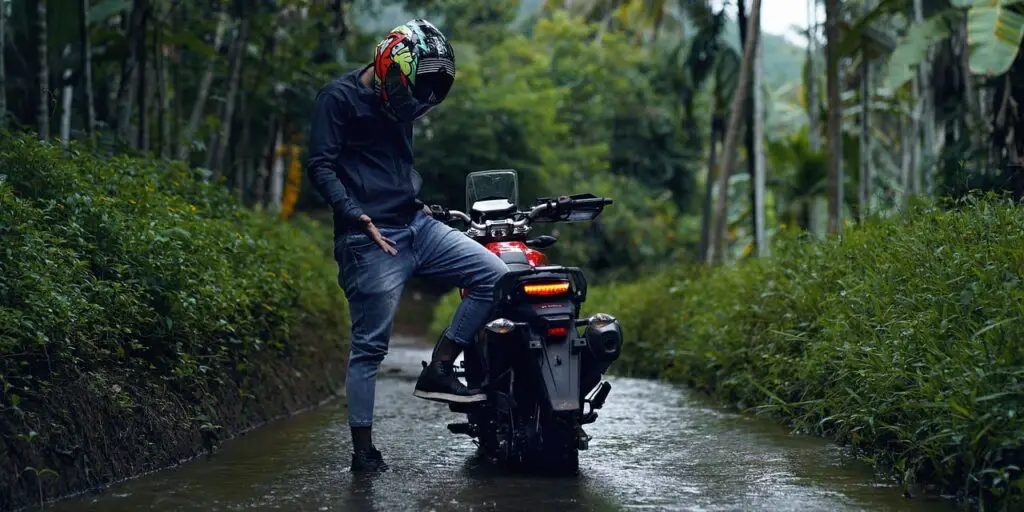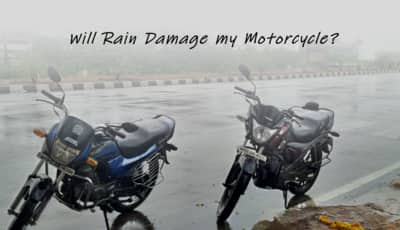Every once in a while the winter weather will be unusually wet, with days and days of rain. This can make it difficult to get out on the motorcycle. But, it’s not always super cold when it rains, and if you’re wearing the right gear, a little rain shouldn’t keep your bike stuck in the garage. Or should it?
So, will rain damage my motorcycle? In most cases, no. Manufacturers make sure that wiring, electrical components, and other parts vulnerable to water, are sealed off and kept dry. Riding in the rain will not damage your motorcycle, but, prolonged exposure to rain and the elements, will eventually cause parts of your bike to deteriorate.
Ever since they were introduced to the public in 1885, motorcycles have always been a favorite option for traveling, either short or long distances. These days, there are more models available on the market than ever before with a host of features even for the most demanding motorcycle owner. Their popularity keeps growing each year, and it certainly doesn’t appear to be ending anytime soon.
Motorcycles Require Special Care
Numerous individuals tend to believe that a motorcycle is like any other vehicle. This is true, but only to a certain extent. In several aspects, the structure of motorcycles differs from other vehicles; thus, the care implemented on them should be different, especially when it is about to rain outside.
Even though it might seem that rain is a good effect due to effortlessly aiding with the cleaning of a motorcycle placed outdoors, avoiding you the hassle of cleaning it yourself, it is not, when you take a look at the bigger picture.
There have been several studies conducted in past and recent times that showcase just how powerful rain can be—to the point of causing destruction to a lot of things it lands on. There are more than a handful of motorcycle manufacturers who have taken note on these studies and thus have persuaded consumers to keep their motorcycles at bay from the rain. There are even some manufacturers who have opted to include a helpful integration to ensure rain does not have a chance in causing destruction. Without a doubt, these have helped consumers around the world be more alerted about this inevitable fact.
What Would Happen If Vulnerable Areas Got Wet?
Electrical connections that are out in the open are the most vulnerable to rain damage. It has also been noted that switchgears, break systems, and batteries tend to take a downfall when rain falls on them continuously. There are a lot of motorcycle owners who believe that these types of issues could be avoided by simply going over motorcycle with a dry rag once rain has subsided, but this is not the case in any situation. Once the rain hits, it penetrates and begins to cause damage, which could become irreversible in some instances.
If the aforementioned vulnerable areas get wet over and over again, you will soon begin to notice their functions deteriorating more and more until they are no longer responsive. These areas are very sensitive to water; thus, for the time being, until manufacturers can create models that are waterproof, you need to go the extra mile in the type of care you implement on your motorcycle before and after use.
Motorcycle repair shops are present to solve a variety of different issues, but if the matter is rain related, there tends to be an absence of a guarantee because there is no assurance that an adequate repair can be achieved, no matter how big or small the problem might be. There have been some cases where motorcycle owners had to either purchase new models or forget about their current models due to having meaningful problems that went hand in hand with water damage. As you can conclude, not opting to prevent issues from arising with your motorcycle could cost your dearly in the financial department, hence why it is always better to prevent rather than lament.
Vintage or Older Motorcycles vs. New Motorcycles
It does not matter if a motorcycle is vintage or new; both deserve the same type of care. This might be surprising to some individuals because there is this popular assumption that in the past motorcycles were manufactured to be more durable, and resistant to water damage than current models. This might appear to be the case at first glance but ultimately this notion is false.
Vintage motorcycles have fewer features than new motorcycles, but even so, most motorcycles with vintage structures share several similarities. Even though there is now more plastic involved in their manufacturing, they are also created using the same types of materials that were used before in a lot of areas. The shell of new motorcycles might appear different to that of old motorcycles, which it is, but only to some extent. Their similarities prevail and thus have a lot in common.
What if you Leave Your Motorcycle In the Rain?
In most cases, as previously mentioned, leaving motorcycle in the rain for a few minutes every now and then would cause its downfall to take place little by little. Now, this is not what would occur if the motorcycle in the rain was left out for prolonged exposure.
Damage could definitely become visible right away. If you are lucky, you might not notice anything, but do not let this convince you that this will come to pass if you opt to leave it in the rain for a long time the second time around. There will be overall damage that you will soon begin to note, which will become worse and worse if it is not taken care of.
Overtime the metal parts of a motorcycle in the rain will also start to rust, especially if areas that don’t have a paint-job for example your brake discs. Also the thin layer of rubber parts on your bike are likely to wear quickly too.
Should It Be Covered when Left in the Rain?
It is highly recommended for motorcycles to not be left outside. A garage would be an ideal area for them to be placed in; nonetheless, there are times when it must remain outside for one or more reasons. If this is the case, it does not matter if there is light rain present, any motorcycle on two wheels, street bike, or touring motorcycle, no matter what year it is, it should be covered.
If you have left your motorcycle in the rain & outside while it was raining and it is somehow not suffering a downfall, purchase a cover as soon as possible to avoid one. Remember that there is no motorcycle exempt from water damage.
Even though there are some manufacturers who are creating heavy-duty motorcycles that can withstand just about anything, they still cannot withstand water damage. Hopefully, this will change in the up-and-coming years so that you have one less worry on your mind, but for the time being, be wise and thus opt for a cover.
What Kind of Cover Is Best?

It very common to see people opting to cover their motorcycles with blankets or any type of plastic they get their hands on. Although these might seem like good options, they are not, especially if the rain outside is heavy. Since rain can occur at any day of the year and at different speeds, a cover is often suggested, one that is manufactured specifically to shield motorcycles from external factors that could cause harm to their functions.
There are some individuals who believe that this type of cover is not really worth it and also believe it is more than likely quite expensive to purchase, but neither of these two assumptions are accurate. It is 100% necessary to have a cover for your motorcycle, and it is quite affordable to acquire one.
There is also a misconception, one that revolves around the idea that a cover is not necessary if motorcycle is going to be kept indoors. This is also incorrect. It is best for every motorcycle to have a cover over it, even if it is in a place that is considered safe.
Besides being able to shield them from the rain, this type of special cover could also shield them to a meaningful extent from air, soil, thermal, radioactive, light, and other pollutions that have been noted to have harmful effects on uncovered motorcycles in more than one aspect.
Compared to the choices available a decade ago, there is now a greater variety of different motorcycle covers on the market to choose from. Contrary to popular belief, motorcycle covers are not made equal. This could easily cause some confusion to arise when you are trying to decide which motorcycle cover is a quality cover and the best choice.
The kind of cover that should be selected is one that is waterproof. Reading the descriptions attached to the bestselling units and then reading the reviews they garnered from consumers could certainly allow you to make a wise selection. Do not think that just because a cover is thin it means that it would do a less successful job in keeping your motorcycle free from water damage than one that is thick. Manufacturers have come up with innovative ways to ensure protection, without having to resort to bulky materials that only result in causing frustration when utilizing them.
Keeping the Longevity of Your Motorcycle Intact
Motorcycles are manufactured of durable materials so that they can last you for many years to come, but even so, it is up to you if your motorcycle ends up having longevity or not. It will all depend on how you take care of it; thus, ensure that it always has a cover on, no matter where it is placed. This type of motorcycle maintenance will certainly aid in keeping it intact.







